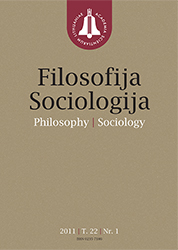Filosofijos idėjų istorija Lietuvoje
The history of philosophical ideas in Lithuania
Author(s): Gintaras KabelkaSubject(s): Philosophy
Published by: Lietuvos mokslų akademijos leidykla
Keywords: formistic interpretation; history of ideas; Lithuanian historiography of philosophy; static and dinamic aspect
Summary/Abstract: In this paper, the static and dynamic aspects of the history of ideas are analyzed, relying on the works of Gintautas Mažeikis and Antanas Andrijauskas. The methodology of the research applied by Andrijauskas corresponds to the standard conceptual principles of the history of ideas. Studying the most significant writings of the most famous thinkers, he comes to the interpretation of cultural tradition as a whole. Then he singles out the ideas he wants to inquire and explicates their functioning in the context of that whole. In the history of ideas, different subjects can be regarded as “ideas”. Andrijauskas understands “idea” as the equivalent of “notion”. The works of Mažeikis can be attributed to the static history of ideas. He prescinds from historical changes and focuses on the distribution of ideas in the synchronic segment of history. From the point of view of historical field structuring, this kind of research is a typical example of formistic interpretation: the denomination of the subject of inquiry as “totally transcendent other” expresses the decomposing operations of formism.
Journal: Filosofija. Sociologija
- Issue Year: 2012
- Issue No: 1
- Page Range: 27-34
- Page Count: 8
- Language: Lithuanian

